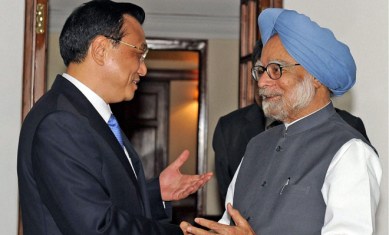Manmohan-Li talks: PM takes tough line on incursion issue
India rejects request to back Beijing stand on South China Sea.

Prime Minister Manmohan Singh on Sunday sought to draw the red line on border incursions with China,making it clear to his Chinese counterpart Li Keqiang that peace and tranquillity on the boundary is at the foundation of this relationship and must be maintained.
In his hour-long interaction with Li ahead of their private dinner,sources said,Singh highlighted the fact that though there were existing mechanisms to deal with any misunderstanding on the ground,it still took a long time to resolve the recent incursion at Depsang.
Both leaders agreed that the two special representatives on the boundary question must look into this issue and examine the efficacy of existing mechanisms while coming up with ways to improve them.
On the issue of trans-boundary rivers,sources said,both sides have largely agreed on an expanded exchange of information on river data but the Chinese side is unwilling to spell out if this would include advance information on construction of dams. The understanding in the joint statement,as of now,reflects an improvement to the existing practice.
Even at the bilateral meeting,when the PM raised this issue,Li is said to have conveyed that China has been sensitive to the concerns of lower riparian countries. Overall,sources said,Li was extremely warm in his interaction with Singh,looking to move beyond the recent incursion issue.
However,negotiations on the joint statement have been far more tough,leading to more exclusions in a bid to arrive at a common understanding.
China,for instance,wanted the statement to endorse its position on South China Sea in the context of security in the Asia Pacific,which meant recognising that the disputes there were internal issues of each country and ought to be resolved bilaterally. It made a strong pitch,but India turned it down saying these were international waters where accepted laws of sea apply.
As a result,there is likely to be a mention of Asia Pacific,but only as an area where both countries have interest in maintaining peace and security.
With the Depsang incursion in mind,the Indian side also stonewalled a Chinese request to refer to the One China policy and Tibets status. New Delhi pointed out that these were dropped in the joint statement issued during Wen Jiabaos visit in 2010 because both sides agreed there was no need to make repeated references.
The new Chinese administration,sources said,was keen to reaffirm this as a marker for a good beginning to the bilateral relationship after the political transition in Beijing.
Similarly,India has ensured there is no reference to the new border defence cooperation agreement proposed by China,indicating that detailed discussions were needed on the subject.
On the plus side,both sides have agreed to mention Afghanistan in the statement and while negotiations are still on,the understanding is that the two countries will back an Afghan-led peace process. India was keen to reflect an agreed position on this ahead of next years US troop pullout.
It may be noted that China has itself initiated a bilateral conversation on Afghanistan,recognising the negative impact any instability in the region can have on Xinjiang.
Among other issues,China is pushing for progress on a FTA,which it calls a Regional Trade Agreement. Li too raised this issue with Singh,who then pointed out to market access issues that Indian companies face in China. To this,sources said,the Chinese Premier seemed to suggest that Indian companies need to conduct detailed market surveys to examine possibilities of setting up joint ventures with their Chinese counterparts.
Singh,however,did underline that the growing trade deficit between both countries was increasingly becoming a source of concern. Both leaders also spent considerable time discussing the global economic scenario.
China has also indicated that it is willing to set up an investment park in India and this commitment could well find a mention in the final joint statement,added sources.
Prime Minister Manmohan Singh on Sunday looked to provide Chinese Premier Li Keqiang a slice of Indias complex and diverse political spectrum by inviting both Leaders of Opposition Sushma Swaraj and Arun Jaitley to the dinner. Also invited was CPM general secretary Prakash Karat along with Congress president Sonia Gandhi and vice-president Rahul Gandhi.